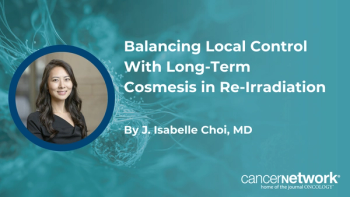
Oncology NEWS International
- Oncology NEWS International Vol 15 No 9
- Volume 15
- Issue 9
Aromasin-Related Bone Loss Affected by Vitamin D Levels
The bone loss associated with adjuvant exemestane (Aromasin) therapy for breast cancer tends to be greater in women who have suboptimal levels of vitamin D
ATLANTA The bone loss associated with adjuvant exemestane (Aromasin) therapy for breast cancer tends to be greater in women who have suboptimal levels of vitamin D, Per E. Lønning, MD, PhD, reported at the 42nd Annual Meeting of the American Society of Clinical Oncology (abstract 554).
A randomized trial among women treated for early breast cancer or ductal carcinoma in situ found that, compared with placebo, exemestane at a dose of 25 mg daily was associated with a significant increase in the annual rate of loss of bone mineral density (BMD) in the femoral neck (2.7% vs 1.5%) and a nonsignificant increase in the lumbar spine (2.2% vs 1.8%) after 2 years of treatment (J Clin Oncol 23:5126-5137, 2005).
"The surprise was that in both arms, the annual bone loss was somewhat higher than what was expected in general from the literature," said Dr. Lønning, of Haukeland University Hospital, Bergen, Norway. "That led us into this subinvestigation, to explore the reasons for this increased bone loss in the whole population of patients, whether they received placebo or exemestane."
The researchers analyzed data on a variety of biomarkers (25-hydroxyvitamin D, calcium, estrogen, and parathyroid hormone) that had been collected at baseline and after 6, 12, 18, and 24 months of treatment.
In all, 147 patients participated in the trial. At baseline assessment, 128 of these patients (88%) had a suboptimal concentration of vitamin D, defined as a level of less than 30 ng/mL.
In the study population overall, body mass index at baseline was significantly correlated with BMD of the femoral neck, Dr. Lønning said. In contrast, vitamin D level at baseline was not, although he noted that analyses were limited by the small number of patients studied and the fact that many other factors likely influenced BMD.
At the femoral neck, the mean change in BMD at 2 years among patients with suboptimal vitamin D status at baseline tended to be greater with exemestane therapy than with placebo (-4.70% vs -3.02%), Dr. Lønning said, but there was little difference by treatment arm among patients with optimal vitamin D status (-3.67% vs -3.29%).
At the lumbar spine, the mean change in BMD also tended to be greater with exemestane (-3.42% vs -2.47%), but the difference was more marked among patients with optimal vitamin D status (-4.31% vs -0.61%).
Impact on Compact Bone
The contrasting findings in the femoral neck and hip could be due to chance, Dr. Lønning said, but he noted that vitamin D status has more impact on compact bone than trabecular bone status. "So it may well be that there is a physiological explanation, and this could be an indication that the interaction of low vitamin D status and low estrogen levels could be detrimental," he said.
The fact that most study patients had suboptimal vitamin D levels was a concern, he said, and possible explanatory factors might include ethnicity and geographic location.
"There have been suggestions in the literature that low vitamin D status could be a risk factor for breast cancer," he said. "So it may beand this has not been properly examinedthat breast cancer patients on average have a poorer vitamin D status than the normal population in general."
Vitamin D Supplementation
Vitamin D supplementation may be important for maintaining bone health in postmenopausal women with breast cancer who receive adjuvant therapy with aromatase inhibitors, Dr. Lønning commented. "This study highlights that there is a need to look into these issues of breast cancer treatment, bone health, and vitamin D status," he said.
Articles in this issue
over 19 years ago
Exjade Gains Approval in EUover 19 years ago
President's Cancer Panel Assesses Progress in Two Areasover 19 years ago
Cognitive Rx Reduces Depression in Breast Ca Ptsover 19 years ago
Nurses Develop Evidence-Based Guidelines for Mucositisover 19 years ago
Anastrozole Therapy for Breast Cancer Affects Bone Healthover 19 years ago
Is Demand for Trial Subjects Outpacing Supply?over 19 years ago
Postchemo Disappearance of Liver Mets Doesn't Mean Cureover 19 years ago
Melanoma Mets Regress After Gene TherapyNewsletter
Stay up to date on recent advances in the multidisciplinary approach to cancer.












































